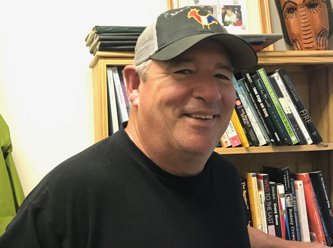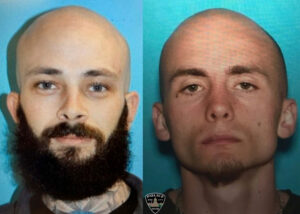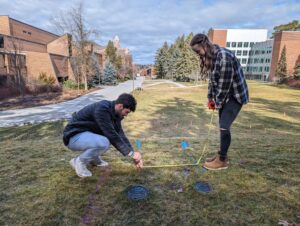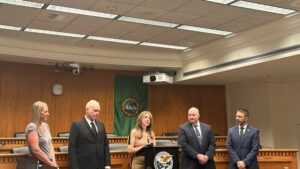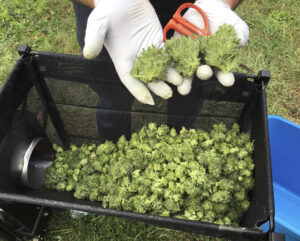His office curtains are shut tight to fend off the many distractions of Moscow, Idaho’s historic district. The shelves are packed with books and dozens of completed journals. Masks from Peru hang from the walls, while a rock from Morocco and a fish knick-knack from Borneo sit on subtle display: tangible memories from a life of adventure.
In this room, Buddy Levy writes.
“I’m a bit of a marathon writer,” Levy said. “Once I start writing I do these hellacious bursts sometimes of 12 to 14 hours a day, which I don’t recommend for health and wellness.”
Levy, 58, is a freelance writer, a TV personality, and an English professor at Washington State University with 31 years of teaching experience. He has travelled the world and writes narrative history books and articles in the realm of travel and adventure journalism. His articles have been published everywhere from “Alaska Airlines Magazine” to “Discover,” and among his seven books are: “No Barriers: A Blind Man’s Journey to Kayak the Grand Canyon,” a book about blind adventurer Erik Weihenmayer, and “Conquistador: Hernan Cortes, King Montezuma, and the Last Stand of the Aztecs,” which is in preliminary development to become a television series.
Levy was one of the four hosts on “Decoded,” a historical mystery solving show that aired on the History Channel from 2010 to 2012. He recently appeared as a talking head in, “The Men Who Built America: FRONTIERSMEN,” which was executive produced by Leonardo DiCaprio on the History Channel. His next book, due for release next year, is “Labyrinth of Ice: The Triumphant and Tragic Greely Polar Expedition.”
Despite these accomplishments, Levy flies relatively under the radar at WSU. Except, of course, in the English department.
“He was a celebrity in our own department and students loved having someone in class they’d seen in other venues,” said fellow English professor Bryan Fry, 41.
Though “Decoded” was cancelled in 2012 and street recognitions have lessened, Levy’s reputation with English students has remained.
“There’s always something new every day, and you know that you should cherish the time because it’s gonna go by in like five minutes,” said Brandon Parkinson, a senior and English major.
Parkinson and his classmates in “English 451: Advanced Creative Writing” know to drag their desks into a circle before Levy arrives. They pull out their laptops and chat while they wait, and when he walks in, they’re prepared to encourage some tangents and interesting anecdotes before workshopping each other’s fictional stories.
Students are not limited to interaction with Levy inside of class. In collaboration with other English professors such as Fry, Levy is always willing to help a student in whom he sees potential.
“Mentorship is pretty fulfilling to me,” Levy said.
Said Fry: “When we find someone who has the fire in the belly, we have often tried to help that student collectively to see how to help get them moving forward.”
When Levy was first starting out himself, he knew he wanted to be a writer. He grew up in Sun Valley, Idaho, five minutes from Ketchum, Idaho, where Ernest Hemingway committed suicide. His first babysitter was Ernest’s granddaughter, Margaux Hemingway, and Ernest’s eldest son, Jack Hemingway, wrote the foreword in Levy’s first book, “Echoes on Rimrock: In Pursuit of the Chukar Partridge.” In Levy’s office, there’s an old picture of him and his brother with the Sun Valley ski team in 1972. Levy had a pen in his front right pants pocket.
“See, I was already a writer,” Levy said. He still keeps a pen in the same place.
Levy was 14 when his first fictional short story, “Opening Day for Danny,” was published in “The Wood River Journal.”
What really started Levy’s career was his interest in a sport called adventure-racing, which is all about surviving in the wilderness. Levy recognized a friend on the adventure-racing show “Eco-Challenge” and got in touch. When the friend recommended Levy visit Morocco with him and his Idaho adventure racing team, Levy made a pitch to the Discovery Channel. They approved it, and they told him if he could get himself to Morocco then he could spend time with the racers and write a story.
“I took a risk and bought a plane ticket,” Levy said. “The plane ticket was more than I got paid for the article, but it was one of those bets you make on yourself.”
The trip resulted in seven more years of content based on adventure-racing. This further resulted in some near-death experiences including riding in a helicopter during a windstorm and almost crashing into a mountain. Levy also learned a lot about networking.
Levy traveled to Greenland to cover a story for the magazines “Adventure Journal” and “Canoe & Kayak,” about Erik Weihenmayer – a blind adventurer who had summited Mount Everest. Levy does not feel he has written his magnum opus.
“In my case it’s more the relationship-building,” Levy said. “One story on Erik morphed into four or five more plus a book.”
Levy built another relationship with a more widely known WSU celebrity: the 57-year-old coach of the WSU football team, Mike Leach. Levy and Leach talked over the phone about possibly writing a book together months before Leach was hired at WSU, and he had no idea Levy was a fellow staff member until Levy visited him in his office.
“It was one of the biggest coincidences of my life,” Leach said.
They then began collaborating on “Geronimo: Leadership Strategies of an American Warrior.” They often worked together in Cafe Moro and Leach said he would work with Levy again though there isn’t anything planned right now.
“He’s a very steady, stable guy – hilarious, has a ton of interests and hobbies,” Leach said. “It’s one of those things where we never have enough time together.”
The same man who shuts himself in an office in Moscow for hours on end, who has students clap at the end of each peer workshop, who many members of the WSU community wouldn’t know by name or face, has also climbed a cliff with a blind adventurer, slept in hammocks between jungle trees and screeching howler monkeys, and followed the same route the conquistadors took to stand in the Paso de Cortés and look over the valley of Mexico just as they did.
“There’s a largeness to those stories and so there’s a largeness to Buddy,” Fry said.




